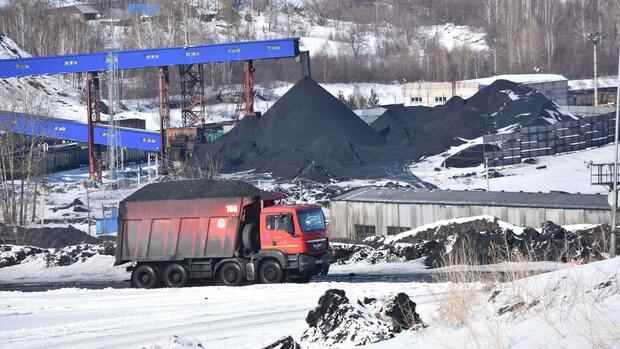The EU wants to stop importing coal from Russia in response to alleged crimes by the Russian army.
(Photo: dpa)
Brussels The EU Commission has presented a fifth package of sanctions against Russia and is planning a partial energy embargo for the first time: Russian coal should no longer be allowed to be imported into the EU.
Deliveries of gas and oil, on the other hand, are to remain untouched for the time being. The federal government, among other things, had insisted on this, as the Handelsblatt had already reported on Monday.
However, the ban on coal imports will not come into effect immediately. Instead, a transition period of three months is planned so that companies can let existing contracts expire. The sanctions package also affects Russian banks, shipping companies and other individuals. The 27 EU ambassadors still have to decide on the package on Wednesday.
With the new sanctions, the EU is reacting to the bodies found in the small Ukrainian town of Bucha near Kyiv. “These atrocities cannot and will not remain unanswered,” said Commission President Ursula von der Leyen on Tuesday. The sanctions have been expanded “so that they cut even deeper into the Russian economy.”
Top jobs of the day
Find the best jobs now and
be notified by email.
Four Russian banks, including the country’s second largest bank, VTB, are now being completely excluded from the western financial sector. Russian ships are no longer allowed to call at EU ports. However, there are exceptions for deliveries of food, energy and humanitarian aid.
In addition to Russian coal, the import of wood, cement and liquor from Russia will also be banned. The Commission is also imposing further export bans on European high-tech goods such as semiconductors and machines. “In doing so, we will further weaken Russia’s technological base and industrial capacities,” said von der Leyen.
The names of the sanctioned persons were not initially known. So far, several hundred oligarchs, politicians and other supporters of the Putin regime have been blacklisted. They are no longer allowed to enter the EU and their assets are frozen.
Several European governments had also pushed for a halt to oil and gas imports. But a number of countries, above all Germany, reject this. Finance Minister Christian Lindner emphasized on Monday that Russian gas cannot be replaced in the short term.
An oil embargo is also not planned so far. However, consideration is being given to how to reduce Russia’s oil revenues. “We are working on additional sanctions including on oil imports,” von der Leyen said. The Commission is examining some of the ideas from member states, such as taxes or special trustee accounts.
More: Heated Economists Debate: What Real Effects Would an Embargo on Russian Energy Have?
